Design-Build Frequently Asked Questions
About Home Remodeling in Philadelphia and The Main Line
Home remodeling is at once exciting and daunting. It gives you the chance to upgrade the house you love, adding to its value, increasing its lifespan, and making it reflect your current lifestyle. However, remodeling is a process that requires an investment, as well as a significant time commitment.
To help you feel confident and informed before undertaking your project, we’ve put together a list of our most frequently asked questions about the basics of home remodeling as well as specific types of renovations.
What is Design-Build Remodeling?
Regardless of what type of home improvement you’re considering, here are some of the questions you may be asking at this point:
What is the difference between a design-build and a general contractor? 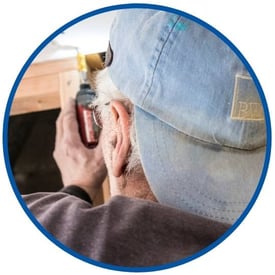
A general contractor is a professional who oversees the day-to-day management of a construction project. They often work off plans drafted separately by an architect, or they may subcontract with an architectural drafter for the design portion of the project. A design-build remodeling company, on the other hand, is a one-source solution to home improvement, as their team encompasses both designers, project managers, and construction personnel to handle every aspect of the remodeling process. In both cases, your general contractor or project manager communicates with suppliers, trade partners, subcontractors, and other individuals involved in the project.
What are the pros and cons of hiring a design-build remodeling company?
There are several advantages to the design-build delivery method for home remodeling. First, you only deal with one contract instead of juggling multiple contracts and have a single source of accountability rather than multiple points of contact at different companies. This leads to better teamwork, communication, and efficiency from start to finish. The person overseeing the construction phase contributes their specialized knowledge and insight during design, which ensures that what is put on paper is what gets built. On the flip side, there are fewer checks and balances, so you have to establish strong trust with your design-build remodeler.
Should I bid out my home remodeling project? 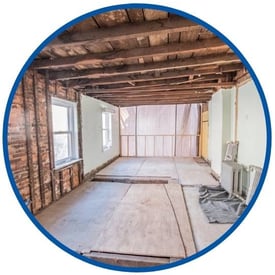
Traditionally, homeowners collect bids from multiple contractors for their home renovation based on plans drawn up by an architect or drafter. When you work with a design-build company, you eliminate the bidding process and work with both design and construction professionals under the same firm. Cutting out the bidding process may raise the initial cost estimate for your home remodel. However, as there are fewer miscommunications, unforeseen complications, and change orders with design-build, your final cost may still be lower.
When do you know it’s time to remodel?
There is no definitive answer to this question, but there are a few key indicators. If your home exhibits signs of deterioration or is no longer functional, you should consider remodeling. As your family grows in size or your lifestyle changes, you also may need to add more space or a particular type of room, like a home office or in-law suite. Additionally, if you’re not utilizing the space you have now, you can make it more functional by remodeling. Finally, be sure you plan to continue living in your Philadelphia home long enough to make it worth the investment.
How do I know if my project is a good fit for design-build? 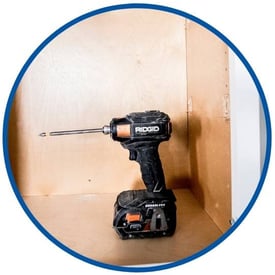
Design-build is rapidly becoming the preferred choice for residential remodeling because of the smooth, efficient process it supports. For a complex new construction project, you may require the expertise of an architect, but a design-build company has the knowledge, experience, and tools to plan and execute all aspects of a remodeling project. Additionally, most contractors are highly familiar with zoning regulations and the permitting process, so they are particularly capable of ensuring that what is put on paper will be approved and can actually be built.
Popular Home Remodels in Philadelphia
If you want to remodel your home in Philadelphia, you have plenty of options to consider. Some of the most popular home improvement projects include kitchen and bathroom renovations; room additions; rooftop decks; and other exterior additions. Below are the top three questions we hear during the home remodeling research process for each type of project.
Kitchen Renovations
What types of kitchen remodels can I choose from? 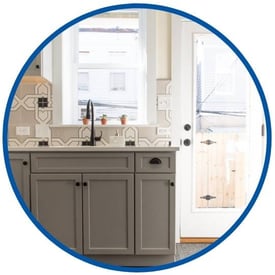
When it comes to kitchen remodels, you can choose from a minor renovation focused on repairs and a few cosmetic upgrades to a complete makeover—or anything in between. It depends on the primary purpose of your remodel, whether you want to optimize space, make your kitchen more functional or update the design style. Based on your vision, we can help you determine the scope of work that accomplishes your project priorities. Learn more about kitchen remodeling.
What is the average cost of a kitchen remodel in Philadelphia?
There are several factors that influence the cost of a Philadelphia kitchen remodel, from the size and current condition of the space to your anticipated scope of work and the quality of materials, fixtures, and appliances you choose. A minor midrange kitchen remodel ranges from about $65,000 to $82,000, while a major upscale kitchen remodels is roughly $110,000 to $140,000. If you bump out or expand the square footage of your kitchen, expect to pay an additional $35,000 to $75,000. Learn more about average kitchen remodeling costs in Philadelphia.
What is the ROI of a kitchen remodel in Philadelphia? 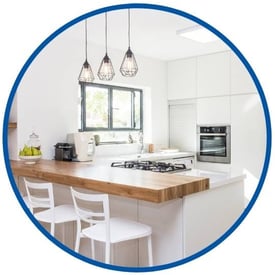
Your return on investment (ROI) for a kitchen remodel in Philadelphia varies based on your specific project, as well as the current value of your home, regional housing trends, and the condition of the market when you sell. However, the average ROI for a minor remodel at a midrange level is about 77%. A major remodel, whether midrange or high-end, is typically between 52% and 56% in Philadelphia.
Bathroom Renovations
What types of bathroom remodels should I consider?
Any bathroom in your home in Philadelphia is worth considering for a renovation or remodel. You can remodel hall baths, powder rooms, or your children’s bathroom to make the space more functional and appealing. Another popular type of project is redoing your current master bathroom or potentially adding one to create a luxurious master suite. Learn more about bathroom remodeling.
I have a small bathroom footprint. Can it be expanded? 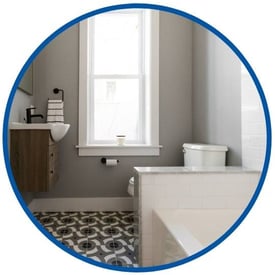
You can expand the footprint of a small bathroom, but it requires a more extensive or complex scope of work as it involves opening walls and altering your plumbing, electrical, and HVAC systems. Depending on the configuration of your house, as well as the size of your property, you can choose between expanding inside—staying within the footprint of your home—or bumping out.
Can I add a bathroom where there wasn’t one before?
You can add a bathroom to your house, either by transforming an empty bedroom or building an entirely new space. This is a common home improvement project as your family grows or children get older. The cost of creating a new bathroom is significantly more than remodeling because you must start from scratch in terms of infrastructure and installing plumbing, electrical, and HVAC. The cost of a small midrange bathroom addition in Philadelphia is about $50,000.
Home Additions
What are the most popular types of additions?
You can add any type of space to your home that fulfills a need or simply improves your quality of life. In general, the most popular types of additions include bathrooms, bedrooms, sunrooms, and in-law suites. It’s also common to consider extending, or bumping out, your kitchen or living room to create more functional space.
Should I build up or build-out? 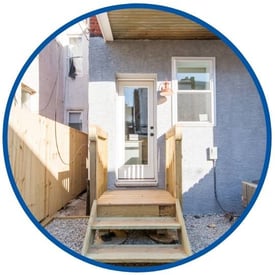
The answer to this question depends primarily on the size and shape of your house, as well as the size of your property. Some Philadelphia homeowners do not have the exterior space that enables an outward expansion. Building up also tends to cost less in terms of labor and materials.
What are my options if I want to remodel my basement?
Your basement may have more potential than you realize. With the right type of remodeling project, you can turn the space into a home office, gym, game room, theater, extra bedroom, wine cellar, or more. Many homeowners also convert their basement into a small apartment or in-law suite. Learn more about basement remodeling.
Rooftop Decks
Are roof decks worth it? 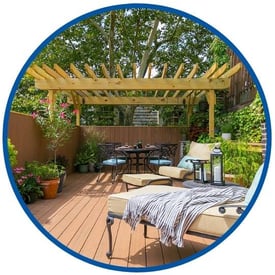
Roof decks are an effective way to create a beautiful and functional outdoor living area, especially if you live in a Philadelphia rowhome or other type of housing with limited yard space. Exterior living spaces are appealing to prospective homebuyers, which means they often have a high ROI. They also contribute to your family’s health and quality of life by providing accessible space to get fresh air, dine outdoors, or host gatherings.
What are the essential features of a roof deck?
Your rooftop deck will need a durable floor, adequate lighting, and some type of railing or enclosure for safety purposes. From there, you can style the space however you want. Most people add outdoor furniture, such as tables and chairs, and greenery. You can also add an overhead pergola or canopy to provide shade.
How do I know if my home can support a roof deck? 
It’s good to evaluate the condition of your existing roof before deciding to add a deck. If it can support at least 55 pounds of weight per square foot, that’s a good start. However, you also want to make sure your roof is structurally sound and there isn’t damage or deterioration. You also must add safe access to the roof. It’s best to consult a roof inspector or other qualified professional before deciding to build a rooftop deck.
Exterior Additions
What are the most popular types of exterior additions?
The most popular types of exterior additions include outdoor sunrooms, custom decks, wrap-around porches, and gazebos. Even a simple patio off a kitchen or bedroom is a nice addition so you can enjoy the outdoors on your own property. We can help you decide what type of exterior living space can maximize the potential of your particular property in Philadelphia.
Can I change the exterior of my home when I remodel? 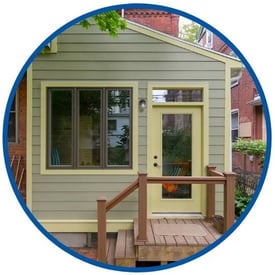
You can remodel or upgrade the exterior of your home through various types of projects. Some of the simpler ways to change the outside of your home include painting, replacing shutters, and adding texture or color accents. More complex outdoor renovations include residing in your home, installing a new roof, changing the size or placement of windows, and adding a porch, deck, or other exterior living.
Historic Home Remodels in Philadelphia
Remodeling historic homes in Philadelphia and the surrounding area is distinct from other types of renovations because you want to preserve the essence and historical integrity of the structure while also making it more comfortable and functional by modern standards. This complex process also tends to involve pulling special permits and abiding by restrictions placed by the Philadelphia Historical Commission, local homeowners’ associations, and other entities. You also want to hire a remodeling team that is experienced working on historic homes.
Here are some of the common questions we encounter when it comes to historic home remodels in Philadelphia:
My home is 100 years old. How can it be remodeled? 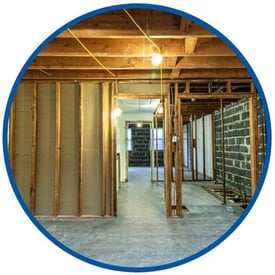
You can remodel a 100-year-old home but it may be a more challenging or complex project. In Philadelphia, there tend to be fewer restrictions on interior improvement projects than exterior renovations. Also, keep in mind there may be certain features—such as custom woodwork, ornate windows, and doors, unique design elements, or hardwood floors—that are worth preserving. Here are some specific ways to do that.
What should I focus on first in a historic home?
When remodeling a historic home, your top priorities should be restoration and preservation. With that in mind, you want to focus first on jobs that ensure the home remains structurally sound, safe, and inhabitable. That often includes repairing or replacing the flooring; updating plumbing systems and electrical wiring; and cleaning up mold, asbestos, lead, or other hazards. From there, you’ll also want to make your home more energy efficient by improving the insulation, replacing old appliances, and updating windows and doors.
How can I make my home more modern while keeping its historical significance? 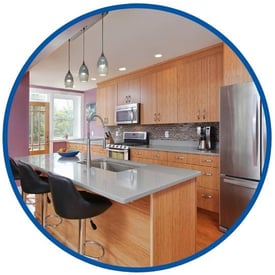
Just because a feature is “old” doesn’t mean it has historic value. The best place to start is by identifying which architectural and design elements actually have historic significance so you can design your remodeling plan to preserve those features. Make design choices that are appropriate for the era and style of your historic property.
